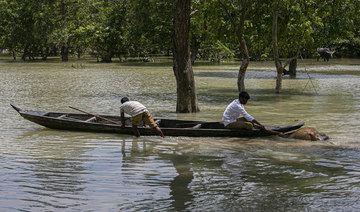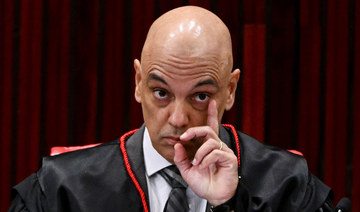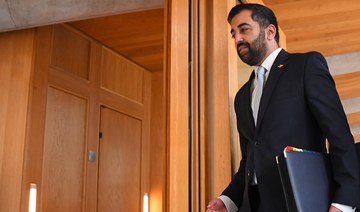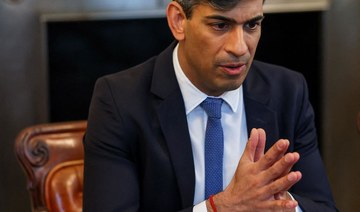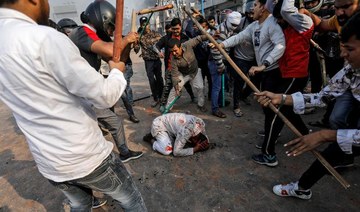NEW DELHI: Ahmed Toweb says his life has taken a turn for the worse since Aug. 31 last year, when his name was left off the National Register of Citizens (NRC), a 7-year-old program to identify “genuine” citizens in India’s eastern state of Assam.
“I’ve faced rejection in three marriage proposals in the last six months. Only my name has been excluded in my family of nine. How is it possible that my parents and other siblings are Indians and I am a foreigner?” Toweb, 28, a social and political activist from Barpara village in the Bongaigaon district of Assam, told Arab News.
“The entire list is faulty and not prepared properly,” he added.
Assam became the first state in India to file a citizenship list last year when it published the NRC, which excluded about 1.9 million people.
The NRC is a by-product of violent civil strife in Assam in the 1980s, when students and political activists led a popular movement to identify illegal Bangladeshi migrants.
To end the agitation, New Delhi signed the Assam Accord with students and the local government in 1985. It ordered a new list of citizens and resulted in a decree that people who entered the state after March 25, 1971, would be declared foreigners.
However, following the accord, no real progress was delivered.
In 2013, the Supreme Court expedited the process and fixed a time frame to complete the NRC process, before the Bharatiya Janata Party (BJP) came to power in 2014 and claimed credit for the list.
With the advent of the BJP government in Assam in 2016, there were allegations that the party was using the NRC to target Bengali-speaking Muslims and consolidate its core vote bloc among Bengali-speaking Hindus.
To save its core Hindu constituency, the BJP brought in the Citizenship Amendment Act (CAA), a law that allows citizenship for Hindus, Sikhs, Jains, Parsis and Buddhists from neighboring Bangladesh, Pakistan and Afghanistan, but excludes Muslims.
For Ahmed Toweb, the debacle has caused concern about the future, especially if his appeal to be included in the NRC is rejected.
“I was very active when the NRC was being prepared, helping others to fill up forms and collect the right documents. Muslims thought the NRC would take off the stigma of being called illegal Bangladeshis, but we failed to understand the designs of the government,” he said, adding that Hindus now have the “advantage of the CAA, but we are left to our own fate.”
Those not listed on the NRC are sent a rejection letter by the government, after which they can appeal to the Foreign Tribunal, a quasi-judicial body, and submit documents to “prove their citizenship.”
“It’s more than a year, and the reason for our non-inclusion has not been explained. As a result, we are in limbo,” Toweb said.
Fatema Begum from Bongaigaon district agreed and said she faces the same dilemma. Her husband is in the NRC, but she is not.
“What will happen to my married life and family if I am declared stateless? Already I am facing a problem. I can’t get a ration from the government shop because my name is not in the NRC,” Begum, 29, told Arab News.
Bongaigaon-based social activist, Rubul Iftikar, said Begum is not alone and that “the situation is so grim, that in his district, two married women have gone insane because their husbands left them after their name was not in the NRC.
“Some young girls who are not in the NRC list are not finding a groom. It’s a desperate situation where Muslims are not at all hopeful that the system would give them justice after the introduction of the CAA,” Iftikar told Arab News.
Experts said there are other motivations behind the NRC.
“The most enduring belief is that the NRC has an inherent bias against Muslims,” Assam-based lawyer A Sabur Tapader told Arab News.
Last year, after the release of the NRC, the BJP rejected the list and called for a review following reports that more than 60 percent of the 1.9 million left out were Hindus.
“The NRC is a political tool for the ruling BJP, and they want to woo the Bengali Hindu voters again by saying that they are fighting for them in court,” he added.
Now there are reports that the BJP is moving the Supreme Court to review the NRC again.
In the meantime, the process has left Bengali Hindus feeling confused, too, with some saying they have become a “political pendulum.”
“It’s difficult to trust the government. Assam will never accept the CAA because of its history. The government just wants to keep the issue alive and keep people fighting in the name of religion,” said Biplab Das of Sonipat district in Assam.
Das’ name is in the list, but his children are not included in the NRC.
Tapader said that with Assam elections scheduled for early next year, the government is reaching out to the Supreme Court to seek a reprieve.
“They have not yet framed the rules of the CAA, and it takes time to implement it. So people now understand the hidden motive of the BJP,” he said.
Delhi-based political analyst Jayanta Kalita said the BJP has an “ulterior motive” in implementing the NRC.
“The BJP had an ulterior motive when it talked about the NRC before 2014. It was not at all concerned about the grave threat posed by the influx of migrants from Bangladesh to Assam’s ethnic demography. Assam made a mistake by trusting the BJP. It showed its true communal colors by passing the CAA that is intended to benefit Hindu migrants,” Kalita told Arab News.
“Assam can’t be allowed to become a dumping ground for illegal immigrants,” he added.
State of despair: Millions left off Assam citizen list
https://arab.news/2v6sa
State of despair: Millions left off Assam citizen list
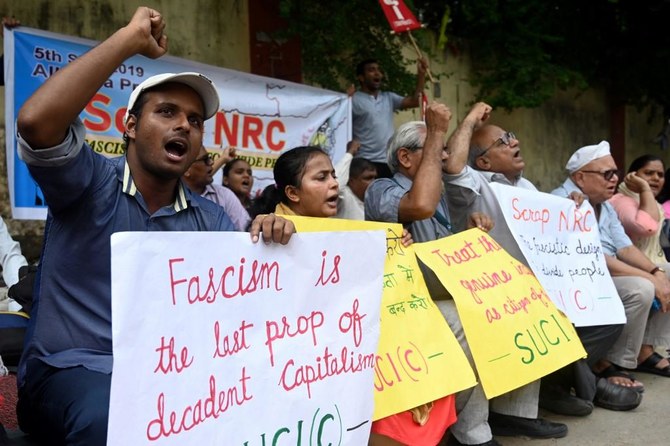
- Assam became the first state in India to file a citizenship list last year when it published the NRC
- “Two married women have gone insane because their husbands left them after their name was not in the NRC,” an activist said
Race against time to rescue Brazil flood victims after dozens killed

- The rainfall eased Saturday night but was expected to continue for the next 24-36 hours, with authorities warning of landslides
PORTO ALEGRE, Brazil: Authorities were racing against time on Sunday to rescue people from raging floods and mudslides that have killed more than 50 and forced nearly 70,000 to flee their homes in southern Brazil.
Viewed from the air, Porto Alegre, the capital of Rio Grande do Sul state, is completely flooded, with streets waterlogged and the roofs of some houses barely visible.
The Guaiba River, which flows through the city of 1.4 million people, reached a record high level of 5.09 meters, according to the local municipality, well above the historic peak of 4.76 meters that had stood as a record since devastating 1941 floods.
The water was still advancing into economically important Porto Alegre and around a hundred other localities, with increasingly dramatic consequences.
FASTFACT
The Guaiba River, which flows through the city of 1.4 million people, reached a record high level of 5.09 meters, according to the local municipality, well above the historic peak of 4.76 meters that had stood as a record since devastating 1941 floods.
In addition to some 70,000 residents forced from their homes, Brazil’s civil defense agency also said more than a million people lacked access to potable water amid the flooding, describing the damage as incalculable.
The agency put the death toll at 55, although that did not include two people killed in an explosion at a flooded gas station in Porto Alegre that was witnessed by an AFP journalist.
At least 74 people are also missing, it said.
Rosana Custodio, a 37-year-old nurse, fled her flooded Porto Alegre home with her husband and three children.
“During the night on Thursday the waters began to rise very quickly,” she told AFP via a WhatsApp message.
“In a hurry, we went out to look for a safer place. But we couldn’t walk … My husband put our two little ones in a kayak and rowed with a bamboo. My son and I swam to the end of the street,” she said.
Her family was safe but “we’ve lost everything we had.”
The rainfall eased Saturday night but was expected to continue for the next 24-36 hours, with authorities warning of landslides.
Authorities scrambled to evacuate swamped neighborhoods as rescue workers used four-wheel-drive vehicles — and even jet skis — to maneuver through waist-deep water in search of the stranded.
UK Labour official acknowledges electoral backlash over Gaza

- Analysis shows decline of nearly 18 percent in Labour vote in areas where over a fifth of the population are Muslim
LONDON: A senior Labour official on Sunday said the party has to recalibrate its campaigning strategy to win back voters opposing its position on Gaza, The Observer reported.
Pat McFadden, Labour’s national election coordinator, told the BBC program “Sunday with Laura Kuenssberg” that it would “work to get people’s support back,” and that the Middle East is a “high foreign policy priority” for the party.
Analysis has revealed that despite substantial gains in Thursday’s local elections in England, as well as Sadiq Khan securing a third term as mayor of London, there was a decline of nearly 18 percent in the Labour vote in areas of the country where over a fifth of the population identify as Muslim.
The analysis, conducted across 930 wards by Prof. Will Jennings from the University of Southampton, highlighted the extent of the protest vote against Labour leader Keir Starmer’s stance on Gaza, particularly his delay in calling for a ceasefire.
Ali Milani, chair of the Labour Muslim Network, voiced concern over the sense of betrayal within the Muslim community.
“We are now seeing the electoral consequence of that,” Milani told The Obsever. “If I was a Labour MP in Bradford or Birmingham or Leicester or parts of London or Manchester, I would be seriously concerned.”
Jennings said: “What this highlights is certainly that Labour is in an uncomfortable position on Gaza. And it is not just Muslim voters.
“But in a general election when we are looking at an anti-incumbent mood and there are fewer small parties and independents, we shouldn’t expect the pattern to be repeated.”
Labour MP Ellie Reeves said: “We have recognized the strength of feeling on this issue. We have called for an immediate ceasefire, we have also said there should absolutely be no ground offensive on Rafah.”
When questioned about Labour’s previous stance on the war, she told The Observer: “Keir Starmer has always been clear that our position would always respond to what is happening there.”
Syrian asylum-seeker plans suicide if sent to Rwanda
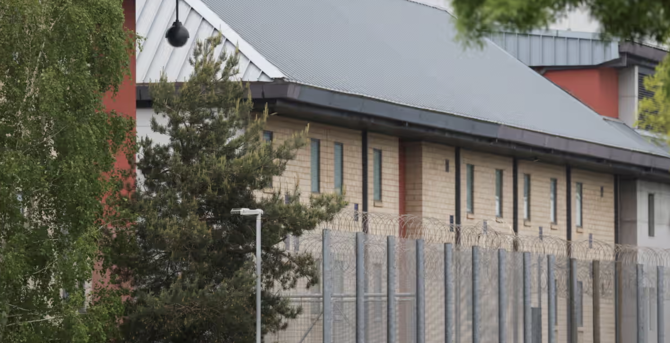
- Man identified as Khaled among more than 100 people set to be sent to East African country
- ‘I will not be safe in Rwanda. If they manage to send me there, I will kill myself on arrival’
LONDON: A Syrian asylum-seeker in the UK set to be deported to Rwanda has said he will kill himself if sent to the East African country.
The man, identified as Khaled, is being held at Colnbrook Immigration Removal Centre with a number of other people due to be sent to Rwanda.
He told The Guardian: “Everyone is so stressed in here because of Rwanda. We can’t eat and we can’t sleep. I was displaced in Syria for nine years and was imprisoned there and I was also detained and tortured in Libya.
“Being in detention is very triggering for me. What matters to asylum-seekers is to be safe. I will not be safe in Rwanda. If they manage to send me there, I will kill myself on arrival in that country.”
Khaled has been in the UK since 2022, and discovered he could be sent to Kigali for the first time in February 2023. He was detained with a view to removal last week.
“They arrested me and put me in handcuffs in a police cell. The same thing happened to two other people who were reporting — Iraqi Kurds. After we were taken out of the cell we were handcuffed again and taken in a van to the detention centre,” he said.
“I have been trying to see a doctor in the detention centre because of an infection in my leg I need antibiotics for but so far I haven’t managed to get an appointment.”
Another asylum-seeker who did not give his name, and who arrived in the UK from Sudan in 2022, told The Guardian that he had traveled via the Mediterranean and the boat he had been on almost sank.
“I would have been happy to claim asylum in Italy but Italian officials did not fingerprint me and told me to move on to France. There I was told it would be four years before they could consider my asylum claim so I waited in the jungle in Calais to cross to the UK. Crossing the Channel in an overcrowded boat was even more terrifying than crossing the Mediterranean,” he said.
“When I heard about the government’s plans to send asylum-seekers to Rwanda at the beginning of 2023 I was very frightened.
“I escaped from an African country because it was not safe and I am very scared to be deported to another African country because I know it will not be safe for me.
“I was arrested last week when I went to report in Newcastle. They didn’t mention Rwanda until I reached the detention centre and at first just said ‘We are deporting you to a safe third country.’”
The two men told The Guardian that they were struggling to contact legal representatives while in detention, with a seven-day deadline imposed by the Home Office for those wishing to appeal the decision to send them to Rwanda.
The charity Care4Calais has published data suggesting that of the more than 100 people detained to be sent to Rwanda, most come from war zones.
The charity’s head of legal access, Hannah Harwood, said: “The people detained have not had their asylum claims processed, and it’s clear from the first cohort we are in contact with that if their claims were processed they would probably be granted refugee status in the UK. It reaffirms how shameful the Rwanda plan is and why it must be stopped.”
A Home Office spokesperson said: “We take the welfare of people in our care extremely seriously. There are robust safeguarding measures in place to ensure everyone is treated with dignity and has the support they need.
“All detained individuals have access to a mobile phone, internet and landline telephones so they can keep in contact with friends, family and other support.”
Fake videos of Modi aides trigger political showdown in India election
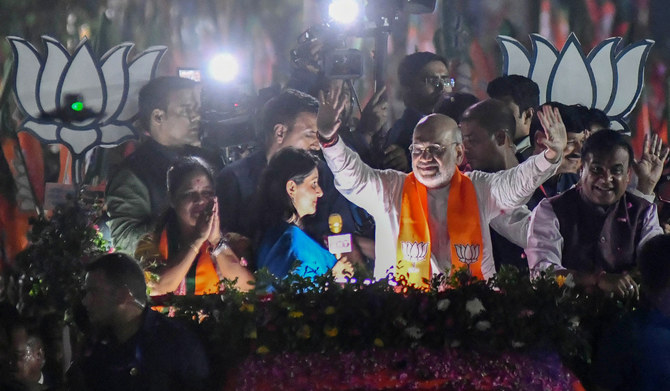
- Congress social media coordinator arrested by Delhi police
BENGALURU, LUCKNOW: Manipulated videos are taking center stage as campaigning heats up in India’s election, with fake clips involving two top aides of Prime Minister Narendra Modi triggering police investigations and the arrest of some workers of his rival Congress Party.
In what has been dubbed as India’s first AI election, Modi said last week fake voices were being used to purportedly show leaders making “statements that we have never even thought of,” calling it a conspiracy “to create tension in society.”
Indian police — already investigating the spread of fake videos showing Bollywood actors criticizing Modi — are now investigating a doctored online clip that showed Federal Home Minister Amit Shah saying the ruling Bharatiya Janata Party will stop certain social guarantees for minorities, a subject sensitive for millions of voters.
Shah retorted on X, posting his “original” and the edited “fake” speech and alleging — without providing any evidence — that the main opposition Congress was behind the video it created to mislead the public. The minister said “directions have been issued to the police to address this issue.”
Indian police arrested at least nine people, including six members of Congress’ social media teams, in the states of Assam, Gujarat, Telangana and New Delhi last week for circulating the fake video, according to police statements.
Five of the Congress workers were released on bail, but the most high-profile arrest made by the cyber crime unit of New Delhi police came on Friday, when they detained a Congress national social media coordinator, Arun Reddy, for sharing the video. New Delhi is one region where Shah’s ministry directly controls police. Reddy has been sent into three-day custody.
The arrest has sparked protests from Congress workers with many posting on X using the #ReleaseArunReddy tag. Congress lawmaker Manickam Tagore said the arrest was an example of “authoritarian misuse of power by the regime.”
Congress’ head of social media, Supriya Shrinate, did not respond to messages and an email seeking comment.
India’s election from April 19 to June 1 will be the world’s largest democratic event.
With nearly a billion voters and more than 800 million internet users, tackling the spread of misinformation is a high stakes job. It involves round-the-clock monitoring by police and election officials who often issue take down orders to Facebook and X as investigations start.
In India’s most populous state of Uttar Pradesh, more than 500 people keep tabs on online content, flagging controversial posts and coordinating with social media companies for their removal when needed, police chief Prashant Kumar told Reuters on Saturday.
Another fake video that sparked a storm last week showed Yogi Adityanath, the state’s chief minister, criticizing Modi for not doing enough for families of those who died in a 2019 militant attack.
Philippines seeks to position itself as top tourism destination at Arabian Travel Market
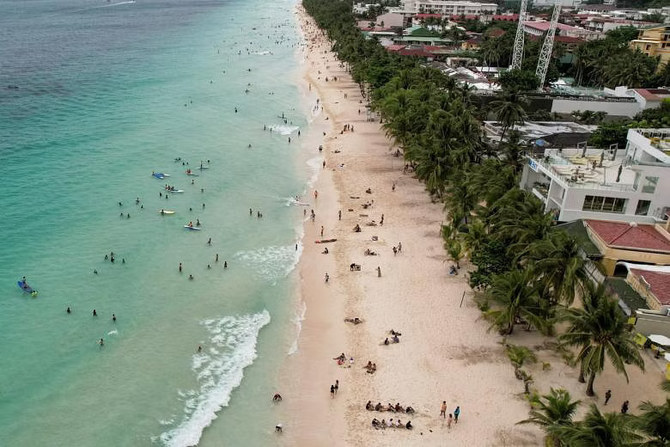
- Philippines has recorded 10 percent increase in visitors arriving from Gulf countries this year
- The country wants to become a preferred destination in Asia and the world
MANILA: The Philippines is working to attract more visitors from the Middle East and position itself as a preferred destination for international travelers, its tourism stakeholders said ahead of the Arabian Travel Market in Dubai.
More than 2,300 exhibitors and delegates from over 165 countries are joining the annual Arabian Travel Market, which this year will take place from May 6 to 9 at the Dubai World Trade Center.
In the Philippines, known for its white sandy beaches, diving spots and diverse culture, tourism is a key sector, contributing nearly 13 percent, or about $44 billion, to its gross domestic product in 2019.
The Department of Tourism will be leading the Philippine delegation in Dubai, as officials set their eyes on promoting the country’s best tourism to the international market.
“We look forward to these opportunities to share the Filipino story to the rest of the world … and to reinforce the Philippines’ position as a preferred destination and top-of-mind choice for travelers,” Secretary of Tourism Christina Garcia Frasco said in a statement.
With its participation at the Arabian Travel Market, the Philippines hopes to sustain the momentum from increased tourist arrivals from the Middle East, she added.
The Philippine tourism industry will not only promote their strengths, such as their tropical and natural attractions, but also diverse offerings in gastronomy and culture, as well as the Filipino tourism workers, “who serve as our best asset for their distinct hospitality and warmth,” Frasco said.
The Philippines has welcomed more 2 million international travelers since the beginning of the year, according to data from the tourism department. This includes a 10 percent increase in visitors arriving from Gulf countries, especially Saudi Arabia and the UAE, which has been among the Philippine government’s key emerging-market targets.
“There’s been a remarkable surge in outbound tourism from the Middle East, particularly from Gulf Cooperation Council countries … We see a growing appetite for international travel among GCC citizens and we see this trend continuing to rise in the coming years,” said Maria Margarita Montemayor Nograles, chief operating officer of the Tourism Promotions Board.
“This is one of the major reasons why we are doubling down on our efforts to maintain and enhance our presence in the Middle East. With our continued participation at the ATM, we aim to position the Philippines as a top-of-mind destination in Asia.”
Tourists from the Middle East are growing more important for some Filipino tourism operators, and represent a significant segment of their clientele, said Manih Karay, president of CTPH Tour.
“To appeal to tourists from Arab countries and promote the Philippines, we highlight the country’s natural beauty, rich cultural heritage, and warm hospitality … Their interest in exploring new destinations and cultural experiences aligns well with our commitment to providing inclusive and diverse travel services,” Karay told Arab News.
Arab tourists also contribute to the growth of the Philippines’ tourism industry, Karay said, adding that they foster cultural exchange and economic development.
“Their visits not only enrich our travel experiences but also promote mutual understanding and appreciation among different cultures,” she said.



